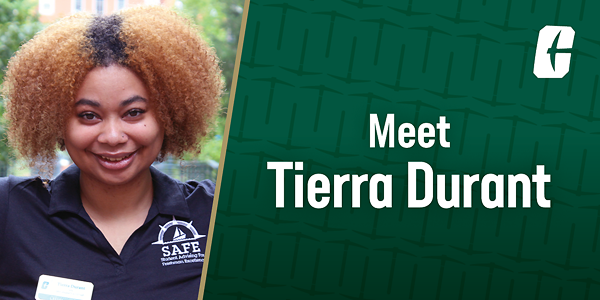
Tierra Durant is a graduate student studying social work in the College of Health and Human Services. She is involved with the Graduate Social Work Association and is a graduate assistant for the Student Advising for Freshman Excellence Program, housed within the Office of Identity, Equity and Engagement. Learn more about Durant in this Q&A.
What is the most rewarding part of being a graduate assistant for the SAFE Program?
The most rewarding part of my job with SAFE has been growing to be a part of a family. I genuinely care about the team and our mentees, and I feel like I’ve been able to grow so much within the role. I now possess leadership and programming experience.
What is the SAFE Program crowdfunding for?
SAFE is a peer mentoring program that supports the transition of first-year students to Charlotte. SAFE Voyage is a week-long program held the week before classes begin, allowing students to navigate campus and be introduced to academic and student support resources while networking with students, faculty and staff. We are looking to raise $5,000 to help support SAFE Voyage.
Why should the campus community support the SAFE Porgram’s crowdfunding project?
The campus community should support our crowdfunding project because SAFE has shown a unique ability to help freshmen with marginalized identities successfully transition from high school to college. Our students later become leaders on campus who move on to do great things.
What are three words to describe UNC Charlotte?
Three words that describe UNC Charlotte are diverse, innovative and resources.
Where is your favorite place on campus?
I love the Popp Martin Student Union.
What do you like to do when you aren't studying?
I like to draw or paint when I am not studying.
What's a fun fact about you many people may not know?
I have an article published along with Susan McCarter, associate professor of social work, in the Journal of Forensic Social Work. The name of the article is “Disproportionate Minority Contact to Racial and Ethnic Disparities in Juvenile Justice: What does it Mean and Does it Matter?”